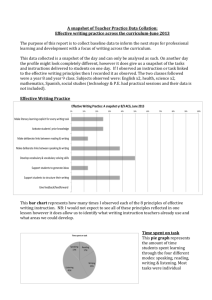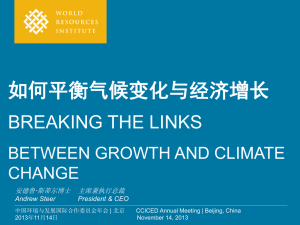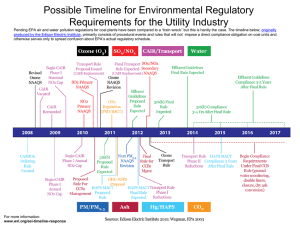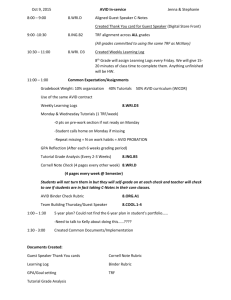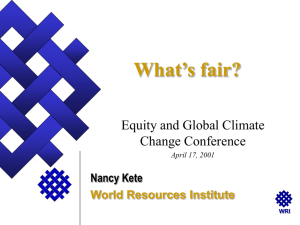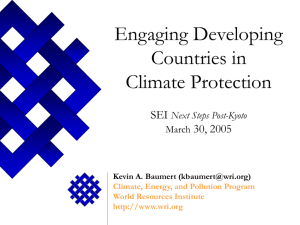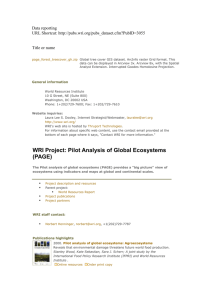Page of 16 Sustainable Asia Leadership Program 10
advertisement
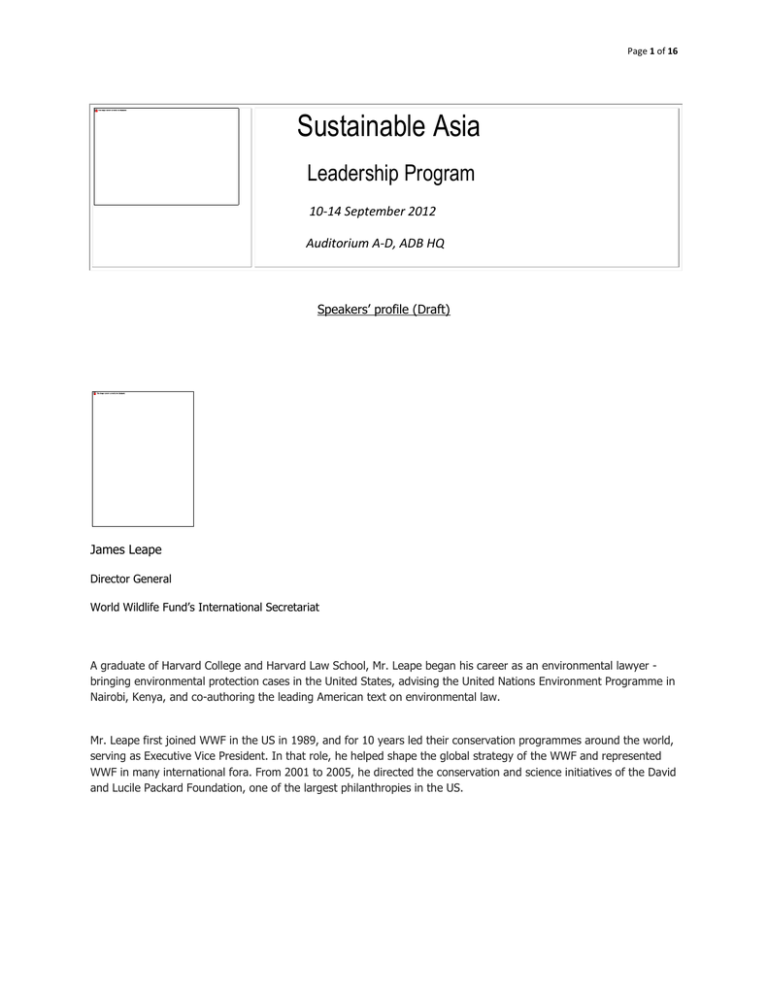
Page 1 of 16 Sustainable Asia Leadership Program 10-14 September 2012 Auditorium A-D, ADB HQ Speakers’ profile (Draft) James Leape Director General World Wildlife Fund’s International Secretariat A graduate of Harvard College and Harvard Law School, Mr. Leape began his career as an environmental lawyer bringing environmental protection cases in the United States, advising the United Nations Environment Programme in Nairobi, Kenya, and co-authoring the leading American text on environmental law. Mr. Leape first joined WWF in the US in 1989, and for 10 years led their conservation programmes around the world, serving as Executive Vice President. In that role, he helped shape the global strategy of the WWF and represented WWF in many international fora. From 2001 to 2005, he directed the conservation and science initiatives of the David and Lucile Packard Foundation, one of the largest philanthropies in the US. Page 2 of 16 Dr. Achala Chandani Abeysinghe Senior Researcher International Institute for Environment and Development Dr. Achala Chandani Abeysinghe is a senior researcher and environmental lawyer at International Institute for Environment and Development (IIED), London. Her interests are in the equity & fairness issues in international climate change negotiations, adaptation to climate change and finance for climate change adaptation. She is the legal advisor to the current Chair of the Least Developed Countries (LDC) group in the UNFCCC negotiations, team leader of global climate governance programme and head of the European Capacity Building Initiative (ECBI) workshops programme at IIED. She is a lead author of the chapter on Climate Resilient Pathways: Adaptation, Mitigation and Sustainable Development in the Fifth Assessment Report of the Intergovernmental Panel on Climate Change (IPCC). Prior to joining IIED in 2009, Achala worked as a Robert S. McNamara Research Fellow of the World Bank. Edward Cameron Director, International Climate Initiative World Resources Institute (WRI) Page 3 of 16 Edward Cameron is the Director of the International Climate Initiative. In this capacity Edward is tasked with shaping and executing an ambitious five-year strategy designed to inject urgency, ambition and innovation into the evolving global climate regime. In partnership with colleagues across the Climate and Energy Program, Edward works to catalyze low-carbon climate-resilient development through evidence-based approaches to mitigation, adaptation, technology and financing. Specific work focuses on the diffusion of clean technologies; the use of robust and transparent systems to measure, report and verify policy progress; and by thinking through adaptation approaches that reduce the vulnerability of people and communities to climate change impacts. Prior to joining WRI, Edward worked at the World Bank’s Social Development Department, where he led initiatives on climate change, human rights and equity; designed a training course on vulnerability and resilience for development practitioners; and contributed to the preparation of Development Policy Loans. Before joining the Bank, Edward served as Senior Advisor on Climate Change to the Ministry of Foreign Affairs of the Maldives – designing the Ministry’s climate strategy, liaising with AOSIS partners, and managing relations with the US government and the World Bank. His proudest achievement with the Maldives was leading the Human Dimensions of Climate Change initiative, which was the first State-led process to link climate change with human rights and has resulted in two UN Human Rights Council Resolutions, the incorporation of human rights language into official UNFCCC texts, and a flurry of academic work examining the role of human rights in reducing vulnerability to climate change. Gov. Joey Salceda Provincial Government of Albay Philippines Jose Clemente "Joey" Sarte Salceda, previously a presidential economic adviser and three-term congressman, was recently appointed by the Philippine government as director and Asian representative to the Board of the Green Climate Fund (GCF) of the United Nations Framework Convention on Climate Change (UNFCCC) in Asia. Governor Salceda’s role is to ensure that the seat serves the needs of developing countries; enhances national and international action on mitigation of climate change, and to support the Fund to ensure it fulfills its objectives of shared vision for long-term cooperative action, including a long-term global goal for emission reductions. Gov. Salceda, who was named United Nations Global Champion for Climate Change Adaptation (CCA) and Disaster Risk Reduction (DRR) for spearheading critical programs in his province and later on adapted by other local Page 4 of 16 government units and the national government, had also served as Advisor of the Green Climate Fund’s Transitional Committee. The Province of Albay under the leadership of Governor Salceda, has been chosen by the National Disaster Risk Reduction and Management Council (NDRRMC) selection committee for the Hall of Fame of “Gawad Kalasag” 2011 for excellence in disaster risk management and humanitarian assistance. This citation is bestowed annually in recognition to Best Provincial Disaster Risk Reduction and Management Council with exemplary achievements in the field of disaster risk management.Gov. Salceda is now focusing on ensuring that preparedness and resources are managed so that development can proceed in the midst of disaster risks in the province. (No photo available) Pastor Delbert Rice Executive Officer Kalahan Educational Foundation, Inc. Reverend Rice has been a missionary in the Nueva Viscaya area since 1965. He has been a key force in supporting the formulation of effective policies, plans and programmes for the development of forest regeneration and rehabilitation, management of forest resources, and forest-based livelihood projects amongst the Ikalahan community. Reverend Rice supported local communities combine traditional land use practices with technical innovation. The approach has not been to intervene directly in establishing co-operatives or community based organizations, but to support the Ikalahan in observing and thinking about their environment, its current state and the reasons for that situation, and the mechanisms for managing the environment for the future. An example of the combination of traditional land use practices with technical innovation developed by the Ikalahan and Father Rice is where the Kalahan Education Foundation (KEF) is preparing a 900 hectare afforestation/reforestation project inside the Ikalahan people’s ancestral domain. The main goal of the project is to help build the ability of the Ikalahan to negotiate and implement an equitable and efficient voluntary carbon-market scheme. The land of the Ikalahan is being used as an action-research site to test environmental services reward schemes in Asia, in conjunction with the World Agro Forestry Centre (ICRAF) through its project titled, “Rewards for, Use of, and Shared Investment in Pro-poor Environmental Services (RUPES) Phase 2”. A series of carbon-trading mechanisms aimed at assisting industrialized countries comply with their quantified emissions limitations and promoting sustainable development in developing countries had been proposed by the Intergovernmental Panel on Climate Change (IPCC)—a body coordinated by the United Nations Framework Convention on Climate Change (UNFCCC) . From these trading mechanisms emerged the voluntary carbon market, a Page 5 of 16 scheme outside the compliance market that enables companies and individuals to purchase carbon offsets on a voluntary basis. Rajendra Singh Chairman Tarun Bharat Sangh Rajendra Singh is known as "the Waterman of India", and he won the Ramon Magsaysay Award for community leadership in 2001 for his pioneering work in community-based efforts in water harvesting and water management in the Alwar district of Rajasthan which had been opened up to miners and loggers who had decimated its forests and damaged its watershed. He established an NGO called 'Tarun Bharat Sangh' (TBS), which was founded in 1975. The NGO based in village Kishori-Bhikampura in Thanagazi tehsil, near Sariska Tiger Reserve, has been instrumental in fighting the slow bureaucracy, mining lobby and has helped villagers take charge of water management in their semiarid area as it lies close to Thar Desert, through the use of johad, rainwater storage tanks, check dams and other time-tested as well as path-breaking techniques. Starting from a single village in 1985, over the years TBS helped build over 8,600 johads and other water conservation structures to collect rainwater for the dry seasons, has brought water back to over 1,000 villages and revived five rivers in Rajasthan, Arvari, Ruparel, Sarsa, Bhagani and Jahajwali. Rajendra Singh is one of the members of the National Ganga River Basin Authority (NGRBA) under Ministry of Environment, Govt. of India, which was set up in 2009, by the Government of India as an empowered planning, financing, monitoring and coordinating authority for the Ganges (Ganga), in exercise of the powers conferred under the Environment (Protection) Act,1986. In 2008, The Guardian named him amongst its list of "50 people who could save the planet". Page 6 of 16 Dr. Ajay Mathur Director General, Bureau of Energy Efficiency Member, Prime Minister’s Council on Climate Change, Government of India As Director General of BEE, Dr. Mathur coordinates the national energy efficiency programme, including the standards and labeling programme for equipment and appliances; the energy conservation building code; the industrial energy efficiency programme, and the DSM programmes in the buildings, lighting, and municipal sectors. Prior to joining BEE, Dr Mathur has worked on energy research, financing, and implementation. He has headed the World Bank’s Climate Change Team in Washington, DC; and the Energy Engineering Division of TERI in New Delhi; and has also been President of Suzlon Energy Limited. Dr. Mathur received his Bachelor's degree in Chemical Engineering from the University of Roorkee, and PhD from the University of Illinois. He received the Outstanding Alumni Award of the University of Illinois in 2002. Dr. Mathur is the co-author of three books, and lead author of several reports of the Intergovernmental Panel on Climate Change. Achim Dobermann Deputy Director (Research) International Rice Research Institute Dr. Achim Dobermann is a soil scientist and agronomist with many years experience working in Asia, North America and Europe. He is recognized internationally as an authority on science and technology for food security and Page 7 of 16 sustainable management of the world’s major cereal cropping systems. He has authored or co-authored over 250 scientific papers and two books on nutrients in rice and has received numerous awards from various academic, government and industry organizations. He is a Fellow of the American Society of Agronomy and a Fellow of the Soil Science Society of America. Achim provides strategic leadership and oversight for IRRI’s research and outreach programs on genetic resources, biotechnology, rice breeding, crop and natural resources management, climate change, socioeconomic and policy research, information sharing, and capacity building. He has spearheaded the development of many new initiatives, such as the Cereal Systems Initiative for South Asia (CSISA) and the Global Rice Science Partnership (GRiSP). Priya Barua Associate World Resources Institute (WRI) Priya Barua joined WRI’s Climate and Energy program as a Research Fellow for the Open Climate Network. The Open Climate Network aims to track national progress on climate change through comprehensive, consistent, and transparent assessments. Her primary work entails coordinating and developing the assessment tools to track lowcarbon growth and competitiveness for OCN in partnership with independent policy institutes from key countries. Prior to WRI, Priya has had several years of experience in both the private and public sectors. She worked in the South Asia Sustainable Development unit of the World Bank on renewable energy and energy efficiency initiatives in India and Afghanistan. She has also worked at ICF International in support of the US EPA’s implementation of the national energy efficiency program, ENERGY STAR. In addition, she has produced comprehensive solar market development reports on the Asia-Pacific region on behalf of the Solar Advisory Services group of IHS Emerging Energy Research. Page 8 of 16 David Cadman President ICLEI – Local Governments for Sustainability David Cadman is the president of ICLEI, and the Deputy Mayor of Vancouver, He is three-term Vancouver City Councilor, who was first elected in 2002. A social and environmental activist, Cadman is a member of Coalition of Progressive Electors. ICLEI is a growing association of local governments dedicated to sustainable development with worldwide presence, which has challenging positions, whose voice is heard, and which is attractive to be a member of, work for and partner with; A high-energy, flexible Movement of local governments working together in networks for performance, supported by campaigns and programs, and strategic alliances; An effective sustainability and environmental Agency demonstrating creativity and excellence both in developing cutting-edge solutions and in program design and execution, ICLEI's mission is to build and serve a worldwide movement of local governments to achieve tangible improvements in global sustainability with special focus on environmental conditions through cumulative local actions. ICLEI's general mandate is to build an active and committed municipal membership of local spheres of government (local and regional governments and authorities) as well as international, regional, national and subnational local government associations. Liu Zhe Institute for Urban and Environmental Studies, Chinese Academy of Social Sciences Dr. Liu Zhe is an economist who has been involved in the area of sustainable development for a number of years. After obtaining her PhD in Economics in 2010, she entered the Institute for Urban and Environmental Studies, Page 9 of 16 Chinese Academy of Social Sciences. Since then, she has been undertaking research on international investment, trade and environment, United Nation Framework Convention of Climate Change negotiation process, and national and regional low carbon actions. She also attended COP 15 in Tianjin and COP 16 in Cancun, Mexico. Dr. Liu Zhe organized and attended a field trip in South Africa and Zambia investigating the best practices of China’s outward investment in Africa, and she also engaged in the field trip to London, investigating the latest low carbon policies in UK. She has participated in several international, national, ministerial level projects, focusing on sustainable urbanization in China, and is acknowledged in China’s low carbon and sustainable development practices. Lutz Weischer Associate, Climate and Energy Program World Resources Institute (WRI) Lutz Weischer is a Research Analyst with the World Resources Institute’s Climate and Energy Program. His work focuses on creating the conditions that enable developing countries to move to a clean energy future. He specializes in international technology cooperation and renewable energy policy in developing countries. As part of his work, he analyzes global trade and investment flows in renewable energy technologies, the policy drivers that encourage their deployment and continuous improvement and the role of international support and public finance in the transition to low-carbon energies. He also follows the international negotiations on climate technology issues at the United Nations, the Clean Energy Ministerial and other fora and coordinates WRI’s work on trade and climate change. Before joining WRI, he has worked for the World Trade Organization’s Trade and Environment Division and the United Nations Environment Program. Page 10 of 16 Kemen Austin Associate World Resources Institute (WRI) Kemen Austin is a forest and climate research analyst in the People and Ecosystems Program. Her work primarily focuses on quantifying forest changes and associated carbon emissions in Indonesia and the Congo Basin. Kemen holds an MA and a BSc in environmental science from Brown University where her research included measuring terrestrial carbon in the northeast United States and the evaluation of carbon offset projects in Sulawesi, Indonesia. Prior to joining WRI she worked with The Nature Conservancy to quantify forest carbon and carbon changes due to small holder agricultural production in the Adelbert Mountains of Papua New Guinea. Ailun Yang Senior Associate, Major Emerging Economies Initiative World Resources Institute (WRI) Ailun Yang is a Senior Associate on WRI’s major emerging economies team, where she leads the efforts to build the case for low-carbon development in a number of major developing countries such as China and India. In this capacity, she is tasked to design, plan, and execute research and policy analysis in order to influence national debates and build the evidence base to accelerate clean technology deployment and sustainable low-carbon development. Prior to joining WRI, Ailun worked with Greenpeace China for 6.5 years. As the head of the climate and energy campaign, she developed and implemented various projects on public awareness raising and energy policy Page 11 of 16 lobby. She worked closely with the Chinese renewable energy industries to campaign for the best supportive policies. She was the main coordination for the multi-organization project the True Cost of Coal, which published the first comprehensive analysis of the external costs of China’s coal consumption. Ailun has been following the international climate negotiation process, and she is one of the most active Chinese non-governmental spokespersons on this issue for media. Carina Bachofen Technical Advisor The Red Cross / Red Crescent Climate Centre Carina joined the Climate Centre in December 2011. She supports the Partners for Resilience program in Nicaragua and Guatemala. Carina specializes in capacity building and training in the areas of vulnerability and adaptation. In addition to working for the Climate Centre, Carina is Global Coordinator for the Ecosystems and Livelihoods Adaptation Network (ELAN), a partnership between the International Union for Conservation of Nature (IUCN), World Wildlife Fund (WWF-US), the International Institute for Environment and Development (IIED) and CARE International. Before joining IUCN, Carina worked for four years at the World Bank in Washington D.C. During this time, Carina codeveloped a learning module on the social dimensions of climate change and led work related to the social component of the Bank’s flagship study, the Economics of Adaptation to Climate Change. Page 12 of 16 Anna Van Paddenburg Sustainable Financing and Policy Strategy Leader Heart of Borneo Initiative – World Wildlife Fund Anna van Paddenburg is the project lead and lead author of the 'Heart of Borneo: Investing in Nature for a Green Economy Report' and website www.hobgreeneconomy.org which was launched at the Rio+20 Earth Summit. She develop strategies to secure long term financial resilience to support a Green Economy in the Heart of Borneo forested landscape, includes exploring a diverse set of sustainable finance sources, finance mechanisms, and necessary policies and incentives to encourage governments of Brunei, Indonesian and Malaysia as well as the business sector and local stakeholders to invest in Heart of Borneo’s natural capital for the benefit of a sustainable and equitable development path. Lory Tan CEO and Vice-Chairman of the Board of Trustees World Wildlife Fund - Philippines Page 13 of 16 Concurrently, Jose Ma. Lorenzo “Lory” Tan sits as the Chairman and President of the Philippine Tropical Forest Conservation Foundation. He is also a Commissioner for Science and Technology of the UNESCO National Commission of the Philippines. As a partner of government, particularly in the drive towards climate adaptation, Lory leads the WWF PH Management Team in the National Convergence Initiative, a partnership with DA / DENR / DAR toward more sustainable integrated area development, founded on an ecosystem approach to resource management. As a co-convenor of The Philippine Imperative, Lory works with this Civil Society initiative, engaging and assisting corporations, local governments and NGOs to craft appropriate responses to climate change, particularly in the area of climate adaptation. He is an NGO member of the Sulu Sulawesi Marine Ecoregion Tri-National Committee, the Protected Area Management Board of Tubbataha Reef Natural Park, and the Joint Management Committee of the Turtle Islands Heritage Protected Area that covers both Malaysia and Philippines. Within the Senior Executive Team of WWF’s Coral Triangle Network Initiative (CTI) covering the Philippines, Indonesia, Malaysia, Timor Leste, Papua New Guinea and the Solomon Islands, Lory’s work focuses in the areas of Business & Industry engagement, Multi-lateral Development Banks, Government & Aid Agency relationships as well as in the emerging field of Public-Private partnerships. As head of the host organization for WWF’s ADB Liaison office, Lory serves as a member of WWF’s Senior Executive Team helping build and steer the partnership between WWF and the Asian Development Bank. Clifford Polycarp Senior Associate, International Financial Flows and Environment Program World Resources Institute (WRI) Clifford Polycarp leads work on international climate and development finance on WRI’s International Financial Flows and Environment team. Clifford is responsible for research, analysis and outreach on public international financial flows for climate and development. He focuses on the role of public international financial institutions, such as the multilateral development banks, in supporting low carbon, climate resilient and sustainable development, and on the governance of multilateral climate funds such as the Green Climate Fund and the Climate Investment Funds. He also supports Page 14 of 16 WRI’s work on finance in the United Nations Framework Convention on Climate Change negotiations and other relevant international processes. Clifford has over a decade of international public policy experience. He worked specifically climate finance and carbon markets for the Stockholm Environment Institute, managed the UK government’s climate change and energy program in India, and published reports on climate change, international trade and other global environmental negotiations for the Centre for Science and Environment in New Delhi. He has also supported the marketing and business development activities of companies such as EcoSecurities, CNBC and ICICI Bank in India. Joo Sueb Lee Senior Program Manager Global Green Growth Institute (GGGI) Mr. Joo Sueb Lee is currently working as a Senior Program Manager at the Global Green Growth Institute (GGGI) and on a leave of absence from his position at the Ministry of Strategy and Finance (MOSF) where he has served since 1998. Most recently, he was a director of the Planning and Coordination Team for the Presidential Council on National Competitiveness (PCNC) from 2009 to 2011. During 2008-2009, he was a Senior Deputy Director, International Economic Affairs Bureau (IEAB) at MOSF. Since his joining the Ministry in 1998, he has been in charge of various policy issues related to economic cooperation and international financial policies. He has been participating in various rounds of Korea’s FTA negotiations with ASEAN, Japan, Mexico and others, especially in the fields of investment and trade in services. He was also a member of policy reform team of Korea’s ODA policies from 2005 and 2006. He also spent the 2007-2008 academic year as an Asia Fellow at the School's Mossavar-Rahmani Center for Business and Government. Mr. Lee has diverse experiences with trade policy, foreign direct investment, Asian economic cooperation, keen knowledge on development aid, economic cooperation between two Koreas, multilateral development banks, and other issues. (No photo available) Asscociate Justice Marilyn B. Lagura-Yap Page 15 of 16 Court of Appeals, Mindanao Station, Philippines Justice Marilyn B. Lagura-Yap was appointed to the Court of Appeals on February 3, 2012. She took her oath on February 23, 2012. Prior to her appointment, she was RTC Judge of Branch 28, Mandaue City for 12 years and Executive Judge for 8 years. Before becoming judge, she was a public prosecutor of Mandaue City for 10 years. Her first job as government lawyer was with RTC, Branch 22, Cebu City in 1985 as Research Attorney and in 1988 as Branch Clerk of Court. In 2006, Justice Yap was a finalist in the Search for Judicial Excellence. In 2007, she was awarded as Outstanding Alumnus in the Field of Law by the University of San Carlos. In 2008, she delivered a lecture on the Salient Features of the Law on Trafficking in the Philippines (RA 9208) to students of the Department of Law, Stockholm University in Sweden as visiting professor of the College of Law of the University of San Carlos, College of Law under the LinneusPalme Programme. In 2009, Justice Yap won the Search for Outstanding Gender Justice Award for the Visayas sponsored by the Philippine Commission of Women. In 2010, Justice Yap was part of the Philippine Delegation of judges who attended the Biennial Convention of the International Association of Women Judges (IAWJ), in Seoul, Korea. Last year, she attended the Roundtable Conference in Paris, France sponsored by the United Nations Environmental Program (UNEP) on Illegal Traffic of Ozone Depleting Substances. Last year too, Justice Yap was one of those conferred with the tatak UP Award in the field of Law and Public Service. Carlos Manuel Rodriguez Vice President Conservation Policy, Conservation International As environment and energy minister for Costa Rica, Carlos Manuel Rodriguez was a pioneer in the development of payment for ecosystem services. The idea is as commonsensical as it is visionary: ecosystems sustain life on Earth, and the people who care for them should be rewarded. Economic incentives to act as stewards of nature’s bounty give locals an attractive alternative to selling mineral and timber rights for short-term gain. Page 16 of 16 This groundbreaking strategy has helped Costa Rica conserve ecosystems that would likely have been pillaged for resources, and was among the policies that have allowed the country to become one of Central America’s strongest economies. Carlos was also a key player in the establishment of a multinational marine park and international efforts to eliminate bottom trawling and other unsustainable fishing practices. In his new role as CI’s regional vice president and director of Conservation International’s Mexico and Central America program, Carlos is expanding the reach of the conservation solutions he spearheaded in Costa Rica.
